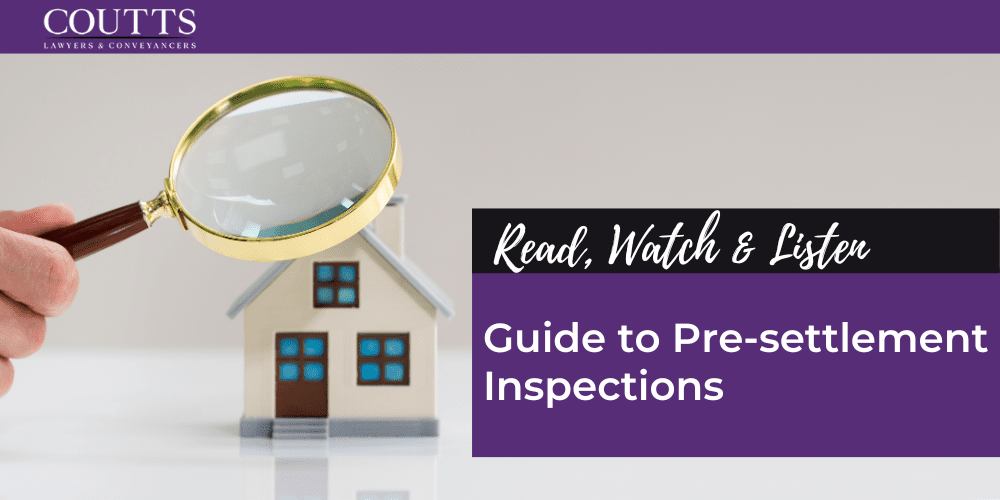KEY TAKE OUTS
- Pre-settlement inspection is the purchaser’s right to view the Property prior to settlement.
- Minor issues can usually be resolved between the parties prior to settlement, however this does not include cleanliness.
- Major issues may allow for settlement to be delayed or for money to be withheld pending the issue being fixed.
Pre-settlement inspections (sometimes known as final inspections) are common in the lead up to settlement of your property. Normally, you have the right to one pre-settlement inspection which can occur within 3 days prior to settlement. Although pre-settlement inspections are not compulsory, they are highly recommended. In this article we touch on why they are recommended, what to look at when doing your inspection and what happens if something isn’t quite right!
Why do you need a pre-settlement inspection?
Buyers often do not realise the importance of a pre-settlement inspection prior to settlement. The pre-settlement inspection allows buyers to check that the property is what they last inspected before exchanging contracts. For example, if someone has been living in the property between the exchange of contracts and settlement, you may wish to check that the property is in the same condition as when you signed the contract. Also, if an agreement was reached with the vendor that they needed to fix a defect before settlement, you need to check this has been completed and you are happy. A pre-settlement inspection is your last opportunity to inspect the property and deal with issues before you pay the balance of the purchase price at settlement.
How to do a pre-settlement inspection
You will need to organise the pre-settlement inspection with the agent (in most circumstances) within 3 days prior to settlement (however it is recommended to you the inspection no less than 2 hours prior to settlement in case there is a problem). If you’re buying a newly constructed property, you may wish to engage a handover inspector to help identify defects which will assist at the end of the 90 defects warranty period.
When looking at the property some of the key things to look out for include:
- the property is in the same condition as when you signed the contract;
- nothing that was meant to be staying in or attached to the property has been removed;
- any damage to the property;
- any rectification work that was agreed to be done by the seller before settlement has been done;
- the property is vacant (unless sold with a tenancy);
- It is important to make sure that everything that is staying with the Property (the Inclusions) are working (this is important on the first inspection prior to buying the Contract, and the pre-settlement inspection). These items may include: The stove, oven, grill and extractor fan, all lights work including the bathroom heat lamp, power points, air conditioning and heating, dishwasher, smoke alarms, garage door remote, alarm system, pool pump.
What to do if you find issues
Sale Contracts provide for the property to be in the same condition on settlement as when the Contract was signed, however, this is subject to fair wear and tear.
If there are minor issues identified, then you may be able to reach an agreement between the agent and vendor. However, minor issues do not include issues with the cleanliness of the Property.
However, if a major issue is identified take photos and advise your Licenced Conveyancer to understand your rights under the Contract. Depending on the circumstances, you may be entitled to delay settlement or negotiate for some funds to be withheld at settlement, but this isn’t always the case. Ultimately, we are always working to reach a fair outcome for our clients so if you are ever unsure your Licensed Conveyancer will be able to guide you.
For further information please don’t hesitate to contact Coutts Lawyers.
This blog is merely general and non-specific information on the subject matter and is not and should not be considered or relied on as legal advice. Coutts is not responsible for any cost, expense, loss or liability whatsoever to this blog, including all or any reliance on this blog or use or application of this blog by you.



